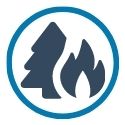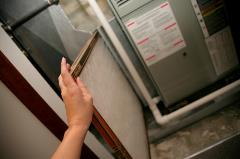
Pro Tips for Staying Cool
Lower your summer cooling costs without sacrificing comfort:
- Set the air conditioning thermostat at 78 degrees or your highest comfortable setting. Higher settings cost less; lower settings cost more.
- Don’t try to speed-cool at a very low temperature setting when you return home from work or school. Your AC won’t cool any faster set at 68 degrees than it does at 78 degrees.
- If you have ceiling fans, run the fans and the air conditioner at the same time, but set the air conditioner thermostat a few degrees higher. A fan’s breeze on your skin increases evaporative cooling. You’ll feel cool at a higher room temperature, which can save a lot.
- Ventilate to keep heat from building up. Turn on your exhaust fans in the kitchen and in bathrooms when they are in use and even for some time after. Use ceiling fans, which will circulate the air in a room and allow you to raise the thermostat setting about 4°F while keeping the same level of comfort. But...
- Turn off fans when you’re away. A fan’s motor adds a small amount of heat to a room.
- Use a microwave instead of the range/oven, or cook outdoors.
- Change the air conditioner’s air filter monthly during heavy use. When the filter is clogged, air flow is restricted and cooling costs rise. A badly clogged filter can lead to compressor failure with a $1,000+ repair bill. Check the evaporator coil every year and remove dust there as well.
Our energy experts answer customer questions LIVE on the Power Hour. Check out relevant past questions and answers below, or join the next Power Hour.

Staying Cool and Healthy When There's Wildfire Smoke
Check out our wildfire prep page for more! When there's wildfire smoke in the air, to maintain indoor air quality:
- If you have an outside air source for ventilation that’s connected to your heating and cooling system, close it.
- If you have central air conditioning (or a heat pump), leave interior doors open so that filtered air from your air conditioning system does not get forced out of gaps in windows, walls and ceilings of rooms that have their doors closed. Air that leaves those rooms will cause outside air to be sucked in to other parts of the house.
- Don’t run a filter-less free-standing fan which will just stir up the particles already in your home.
 Check your furnace filter and if it’s dirty, replace it with a new filter rated with the highest MERV rating you can find that will fit your system. MERV stands for Minimum Efficiency Reporting Value and uses a numbering system from 1-16. The higher the number, the better the filter will perform.
Check your furnace filter and if it’s dirty, replace it with a new filter rated with the highest MERV rating you can find that will fit your system. MERV stands for Minimum Efficiency Reporting Value and uses a numbering system from 1-16. The higher the number, the better the filter will perform. - As a general rule, unless you have a filter capable of removing smoke, you should set the fan on your thermostat to “auto” rather than “on,” so air doesn’t continually circulate (which could draw in outside air. However, if you find your home seems smoky or smoke is increasing with the “auto” setting, switch it back to “on.” Homes differ greatly and the effectiveness of these settings will vary depending on how “tight” a home is sealed.
The idea is to re-circulate your indoor air into your return registers -- through a good filter to filter out the bad stuff -- and then back into your home, cleaner than what it was.
Note of caution: If your home is particularly drafty, following the directions above may draw more smoke into your home. If you notice it getting smokier, try the steps below.
Owners of leaky older homes or with baseboard or wall heat and window air conditioners should take steps to seal air leaks, such as putting towels in front of exterior door thresholds.
Homes differ greatly, so no one method will work for everyone. The main idea is to keep smoke and particulates out, and minimize the amount of air circulating in the house unless you have a good filter system that can circulate clean air within.
Customers with specific concerns about their heating and cooling systems should contact a professional HVAC contractor.
Prep for Smoke